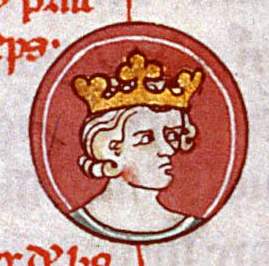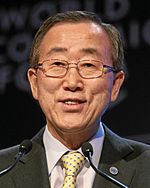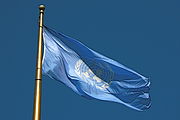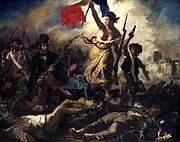Portal:Politics
| Main | Topics and categories | Tasks and projects |
The Politics portal
Politics (from Ancient Greek πολιτικά (politiká) 'affairs of the cities') is the set of activities that are associated with making decisions in groups, or other forms of power relations among individuals, such as the distribution of resources or status. The branch of social science that studies politics and government is referred to as political science.
It may be used positively in the context of a "political solution" which is compromising and non-violent, or descriptively as "the art or science of government", but also often carries a negative connotation. The concept has been defined in various ways, and different approaches have fundamentally differing views on whether it should be used extensively or in a limited way, empirically or normatively, and on whether conflict or co-operation is more essential to it.
A variety of methods are deployed in politics, which include promoting one's own political views among people, negotiation with other political subjects, making laws, and exercising internal and external force, including warfare against adversaries. Politics is exercised on a wide range of social levels, from clans and tribes of traditional societies, through modern local governments, companies and institutions up to sovereign states, to the international level.
In modern nation states, people often form political parties to represent their ideas. Members of a party often agree to take the same position on many issues and agree to support the same changes to law and the same leaders. An election is usually a competition between different parties.
A political system is a framework which defines acceptable political methods within a society. The history of political thought can be traced back to early antiquity, with seminal works such as Plato's Republic, Aristotle's Politics, Confucius's political manuscripts and Chanakya's Arthashastra. (Full article...)
Selected article
Feminism is a collection of movements and ideologies aimed at defining, establishing, and defending equal political, economic, and social rights for women. In addition, feminism seeks to establish equal opportunities for women in education and employment. A Feminist is "an advocate or supporter of the rights and equality of women". Feminist theory, which emerged from these feminist movements, aims to understand the nature of gender inequality by examining women's social roles and lived experience; it has developed theories in a variety of disciplines in order to respond to issues such as the social construction of sex and gender. Some of the earlier forms of feminism have been criticized for taking into account only white, middle-class, educated perspectives. This led to the creation of ethnically specific or multiculturalist forms of feminism. Feminist activists campaign for women's rights – such as in contract law, property, and voting – while also promoting bodily integrity, autonomy, and reproductive rights for women. Feminist campaigns have changed societies, particularly in the West, by achieving women's suffrage, gender neutrality in English, equal pay for women, reproductive rights for women (including access to contraceptives and abortion), and the right to enter into contracts and own property. Feminists have worked to protect women and girls from domestic violence, sexual harassment, and sexual assault. They have also advocated for workplace rights, including maternity leave, and against forms of discrimination against women. Feminism is mainly focused on women's issues, but because feminism seeks gender equality, some feminists argue that men's liberation is a necessary part of feminism, and that men are also harmed by sexism and gender roles.
Featured picture

Photo taken by a Lockheed U-2 spy plane of the San Cristobal MRBM launch site in Cuba, November 1962, after the Cuban Missile Crisis. Although this image was taken days after the crisis had ended (October 28), this image has become iconic of the crisis to the point where it is often cited incorrectly as having been taken during the crisis.
Selected quote
Selected biography
Ban Ki-moon (born 13 June 1944) is a South Korean diplomat and the former Secretary-General of the United Nations. Before becoming Secretary-General, Ban was a career diplomat in South Korea's Ministry of Foreign Affairs and in the United Nations. He entered diplomatic service the year he graduated college, accepting his first post in New Delhi. In the foreign ministry he established a reputation for modesty and competence. Ban was the Foreign Minister of the Republic of Korea from January 2004 to November 2006. In February 2006 he began to campaign for the office of Secretary-General. Ban was initially considered to be a long shot for the office. As Foreign Minister of South Korea, however, he was able to travel to all of the countries that were members of the United Nations Security Council, a manoeuvre that turned him into the campaign's front runner. On 13 October 2006, he was elected to be the eighth Secretary-General by the United Nations General Assembly. On 1 January 2007, he succeeded Kofi Annan, and passed several major reforms regarding peacekeeping and UN employment practices. Diplomatically, Ban has taken particularly strong views on global warming, pressing the issue repeatedly with United States President George W. Bush, as well as Darfur, where he helped persuade Sudanese President Omar al-Bashir to allow peacekeeping troops to enter Sudan.
Did you know (auto-generated) -

- ... that one abolitionist said that William L. Breckinridge's anti-slavery views would "disqualify [him] from political usefulness"?
- ... that Australian senator Ben Small had been a ship's officer, bar owner, paramedic, ambulance trainer, and logistician before entering politics?
- ... that thousands of political prisoners in Indonesia were interned in the Waeapo River valley in Buru?
- ... that despite most of the polls and 50 major political writers predicting victory for Thomas E. Dewey, Harry S. Truman won the 1948 presidential election?
- ... that a Chinese corruption investigation into Gao Yan has been interpreted as a political move against Li Peng, then second-in-command of the Communist Party of China?
- ... that Azerbaijan has been a member of the Council of Europe, an organization promoting human rights, for more than twenty years, despite holding political prisoners and rigging elections?
More did you know...
- ...that the public activist group Citizen Action shut down in 1997 due to the effects of a labor union election campaign funds scandal?
- ...that the National Assembly of Azerbaijan was the first secular republican parliament in the Muslim world?
- ...that in world-system theory, sociologists debate whether two world-systems have ever existed during the same period?
- ...that former Republican California State Senator Becky Morgan served on the Board of Trustees of both her alma maters, Stanford University and Cornell University?
- ...that co-founder of the Saudi Civil and Political Rights Association Mohammed al-Bejadi spent most of 2011 in prison?
- ...that the Proletarian Revolutionary Organisation of Nepal proposed a synthesis of Buddhism and Maoism in 1977?
In this month
- June 28, 2004 - Canadian federal elections occur; the Liberal party loses its absolute majority.
News and Current events
- August 11: 4 local government areas in New South Wales, Australia locked down after COVID-19 case
- August 11: Australia: AstraZeneca vaccine access expanded by Victorian government
- August 1: Australia: Victorian lockdown lifted
- July 29: Tunisia's president dismisses prime minister, suspends parliament
- July 25: Australia: Wikinews interviews Reg Kidd, mayor of the City of Orange, about COVID-19 lockdown and local government
- July 23: South Australia enters week-long lockdown to contain COVID-19 Delta variant spread
- July 21: Technological University Dublin senior lecturer Dr Lorcan Sirr speaks to Wikinews on housing market in Ireland
- July 21: Three rural councils in New South Wales, Australia enter 7-day lockdown
- July 21: Australia: Victoria lockdown extended by a week with 85 active cases recorded
- July 15: California governor signs new state budget, eligible Californians to get stimulus payments
Topics and categories
General images
Related portals
Associated Wikimedia
The following Wikimedia Foundation sister projects provide more on this subject:
-
Commons
Free media repository -
Wikibooks
Free textbooks and manuals -
Wikidata
Free knowledge base -
Wikinews
Free-content news -
Wikiquote
Collection of quotations -
Wikisource
Free-content library -
Wikiversity
Free learning tools -
Wiktionary
Dictionary and thesaurus



























































